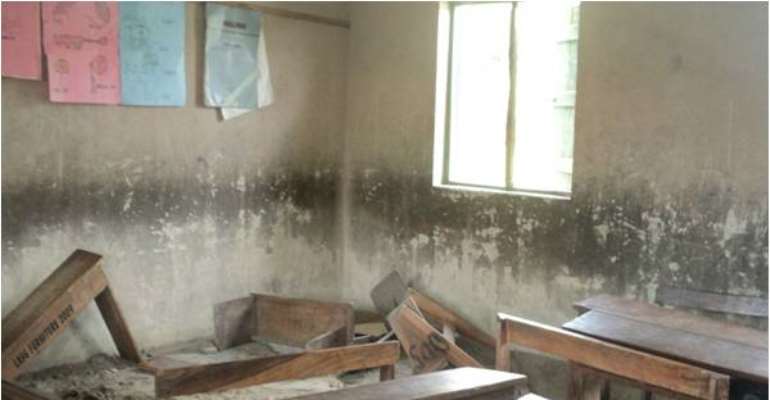Education In Rural Nigeria: An Assessment

In the Nigeria’s National Policy on Education (FRN 1998), it is stated that the Federal Government has adopted education as an instrument for effecting National Development in all areas of the nation. However, this does not reflect the situation in rural Nigeria where there is overwhelming widespread of illiteracy.
Education in rural Nigeria is characterized with very poor infrastructure, insufficient academic staff, insecurity, and non-payment of academic staff among others. It is common knowledge that majority of the population in developing countries like Nigeria live in rural areas. Nigeria is predominantly a rural society as the vast majority of her population live in rural area. Generally, rural areas in Nigeria are incessantly neglected by the government when it comes to development of any form, educational development inclusive.
Despite the fact that rural dwellers in Nigeria are usually not recognized on government development activities, the nation’s wealth is derived from rural areas across the country. Crude oil, limestone, coal among other resources possessed by the country are hugely deposited in rural areas. The under-development in Nigeria as a country has been linked to lack of development in the rural areas. A view states that no serious, active, conscious, sensitive, and organized government would want to neglect rural communities.
Lack of development has a positive correlation with the neglect of rural areas. Rural neglects brings negative consequences such as exodus of rural dwellers to urban areas, with resulting problems of unemployment, crimes, prostitution, child labour, insecurity, money laundering, bribery, poverty, proliferation of shanty living areas, spread of diseases, and overstretching of the facilities and infrastructures in the urban areas.
Having travelled to and through rural areas in various geo-political zones of the country, the sight of education facilities in rural areas of Nigeria is disheartening, particularly in the 21st century. From broken classroom walls, to opened roofs, damaged chalk board, over population and lack of sufficient chairs and tables in classes, bushy environment that houses reptiles to mention a few, the educational plight in rural Nigeria calls for immediate “unpolitical” attention. Having visited some rural schools in South West, North Central and North West Nigeria, the current situation tends to endanger the nation’s future if not revived. In one of the North Central states, pupils have been learning under a shade for many years before the local government authority managed to erect a single building for all classes. This is one of others been faced by critical challenges.
Education is to a nation what the mind is to the body, just as a diseased mind is handicapped in the coordination and direction of the bodily activities. Therefore, the single most significant complex of social – control tools for national development is found in the educational system. Since majority of the population still live in rural areas, education which is believed to be the bedrock of any serious nation’s development should be experience serious development in rural areas, hence it is expected of Nigeria’s government and relevant stakeholders to take the issues of education in rural areas seriously. Challenges confronting rural education in Nigeria include:
Lack of Infrastructure: There is a huge infrastructural deficit in rural education development in Nigeria. Majority of the rural schools are poorly built and very old with damaged roofs and walls. Other educational facilities such as chairs and tables are usually not sufficient; libraries do not exist in many rural schools e.t.c.
Poor Legislative Oversight Duty: Legislative oversight duty is a serious way the legislature can check the executive by supervising projects awarded and asking important questions on budget and expenses on such project. However, the legislators have performed poorly in their oversight function. Thus, some of the approved rural schools are not well constructed or not constructed at all.
Insufficient Academic Staff: There has been an incessant shortage of academic staff in rural schools for many years in Nigeria. This explains why a teacher can be saddled to teach two or more subjects/courses, sometimes outside his/her discipline.
Poor Learning Facilities: Learning facilities in rural Nigeria are in very poor conditions, if at all they exist. Computer laboratories, internet and other things that will expose the children to global standard in their studies are absent.
Poverty:This is an underlining factor in Nigeria as a whole. People in rural areas live below a dollar daily. The poverty level is so high for them to afford schooling opportunities for their children.
Corruption:This problem has affected Nigeria negatively in all sectors. Embezzlement of educational funds, scholarship and grants has marred the effort to develop education in rural Nigeria.
Critically assessing the first post-independence National Educational Nigerian Conference on Curriculum development organized in 1969 by the Nigerian Educational Council with the following resolutions:
- Provision and expansion of educational facilities to ensure education gets to the door step of every Nigerian child.
- Overhauling and reforming the content of general education to make it more responsive to the socio-economic needs of the country.
- Development and consolidating the nation’s higher education in response to the manpower needs of the country.
- Developing technological education in order to meet the growing needs of the nation.
All these resolutions failed because of the lack of commitment from the government. Education is fundamental to growth and development, and serves as critical indices to measure progress of development agenda. Therefore, deliberate effort should be made to develop the sector particularly in rural areas. This will include provision of educational infrastructures and facilities, sustainable curriculum and policies, employment of more academic staff, strengthening oversight function on educational facilities and scholarship for students. Education is the most powerful tool of reducing poverty, ensuring peace and stability and advancing a people through inventions, a nation cannot grow beyond her level of education, for Nigeria to grow, education must grow.
Olawale Rotimi can be reached via [email protected] or +2348105508224
